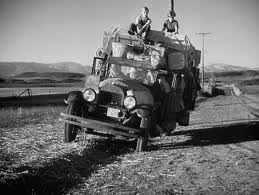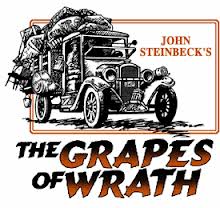Favorite Books: The Grapes of Wrath
As this blog presumes to be at least partially dedicated to the things that inspire us I thought that my first contribution would be to re-visit a story that has deeply influenced me since my first reading in tenth grade. After combing my bookshelf for a book to provide some glimpse into who I am and how I think I decided on John Steinbeck’s The Grapes of Wrath. (As a disclaimer, no one should expect this post to be a literary dissection of one of the most dissected books of the 20th century, and this post can’t possibly encompass all of my ponderings on this story but here are a few thoughts.)
 The Grapes of Wrath is a classic of American literature for its raw depiction of the harsh realities of the Great Depression and the social and economic conditions that accompanied the dust bowl and the mass migration of displaced farmers to the West coast in search of a better future. It is the story of the Joads, a family from Oklahoma who is forced off their land during the dust bowl and decides to seek a new life in the promised fertile lands and green pastures of California.
The Grapes of Wrath is a classic of American literature for its raw depiction of the harsh realities of the Great Depression and the social and economic conditions that accompanied the dust bowl and the mass migration of displaced farmers to the West coast in search of a better future. It is the story of the Joads, a family from Oklahoma who is forced off their land during the dust bowl and decides to seek a new life in the promised fertile lands and green pastures of California.
When the book was first published in 1939 it was banned and burned for its leftist views as communist propaganda, but as many a student has found unpacking this story for their lit teacher, Steinbeck’s very personal story of the Dust Bowl Diaspora can be understood as much more than a political disquisition on labor relations or the plight of the poor. Steinbeck set out to write the story of every person who struggles in search of life, in search of that mythical greener grass.
The second time I read this book it was a used copy with a thoroughly bent spine (published by Penguin Modern Classics). I loved reading it the first time but felt that with a few more years of knowledge and experience I might read the novel with more perceptive eyes. I don’t always read the forwards to books, but for whatever reason I decided that I would read this one. The forward for this edition proved to add immense value to the book as Steinbeck scholar Robert DeMott provided the historical context of the novel’s creation explaining the editorial drama that led to its publishing. DeMott describes the personal experiences Steinbeck recorded in his journals as he visited squatter camps and witnessed the woes of the migrants that he described as “gypsies by force of circumstance”. DeMott also describes the biblical, spiritual, and thoroughly American parallels that bring the story of the Joad family outside of the material conditions of hardship and establish the human transcendence of the novel. DeMott writes:
(published by Penguin Modern Classics). I loved reading it the first time but felt that with a few more years of knowledge and experience I might read the novel with more perceptive eyes. I don’t always read the forwards to books, but for whatever reason I decided that I would read this one. The forward for this edition proved to add immense value to the book as Steinbeck scholar Robert DeMott provided the historical context of the novel’s creation explaining the editorial drama that led to its publishing. DeMott describes the personal experiences Steinbeck recorded in his journals as he visited squatter camps and witnessed the woes of the migrants that he described as “gypsies by force of circumstance”. DeMott also describes the biblical, spiritual, and thoroughly American parallels that bring the story of the Joad family outside of the material conditions of hardship and establish the human transcendence of the novel. DeMott writes:
“Steinbeck conceived his novel on simultaneous levels of existence, ranging from socio-economic determinism to transcendent spirituality… On one level it is the story of a family’s struggle for survival in the Promised Land… On another level it is the story of a people’s struggle, the migrants’. On a third level it is the story of a nation, America. On still another level, through… the allusions to Christ and those to the Israelites and Exodus, it becomes the story of mankind’s quest for profound comprehension, of his commitment to his fellow man, and to the earth he inhabits”
Robert DeMott (p. xiv)
The story of the Joad family is the story of every individual who is confronted with the trials of circumstance. It is the story of humans encountering hardship in search of a destination, but upon arrival the destination is found different than expected. Less satisfying. Altogether elusive. It is the search for the Promised Land and the difficult path we take during the process.
Along the Joads’ path to California the family has been disenfranchised, lost their grandfather, suffered hunger, ridicule, abuse from police, and a heart breaking homesickness for the comfort of their Oklahoma farm. As they begin to settle in a government run squatter camp called ‘Weedpatch’ they begin to finally feel a community amongst the other migrant families displaced in the Western land. It is at this point that the heroically strong matriarch of the family, Ma, reflects on the journey they’ve taken thus far, as she considers the pain and the heartache of the journey, but also expresses the feeling of hope within community. She says,
grandfather, suffered hunger, ridicule, abuse from police, and a heart breaking homesickness for the comfort of their Oklahoma farm. As they begin to settle in a government run squatter camp called ‘Weedpatch’ they begin to finally feel a community amongst the other migrant families displaced in the Western land. It is at this point that the heroically strong matriarch of the family, Ma, reflects on the journey they’ve taken thus far, as she considers the pain and the heartache of the journey, but also expresses the feeling of hope within community. She says,
“We’re Joads… We was farm people till the debt. And then—them people. They done somepin to us. Ever’ time they come seemed like they was a-whippin’ me—all of us. An’ in Needles [a city in the story], that police. He done somepin to me, made me feel mean. Made me feel ashamed. An’ now I ain’t ashamed. These folks is our folks—is our folks. An’ that manager, he come an’ set an’ drank coffee, an’ he says, ‘Mrs. Joad’ this, an’ ‘Mrs. Joad’ that—an’ ‘How you getting’ on, Mrs. Joad?’” She stopped and sighed. “Why, I feel like people again.”
John Steinbeck
For most people there comes a time or a season where we feel like life is a-whippin’ us and we start to feel ashamed and even embittered by our circumstance. But through those moments there is hope and there are those who care. It is this refrain of the human experience around which Steinbeck builds his narrative and invites readers to join in the experience.
Everyone has heard the familiar axiom: it’s not about the destination but the journey. This is a bit of wisdom that is offered by someone to sooth the pain of disillusionment or re-calibrate a person’s purpose and implore them to acknowledge the good that can exist in a painful process. Yet when the journey hurts as much as it does for the Joad family, those words seem as empty as the stomachs Steinbeck describes groaning for food in the shantytowns along the highway. The tension between hope and despair is what makes The Grapes of Wrath a story that transcends time and speaks to the reality of mankind’s struggle and search for a Promised Land.
For those who have never read this story maybe this will lead you to Steinbeck the next time you’re at the bookstore. For those who have read it maybe it will shed some new light on a familiar story.
J


Thoughts?